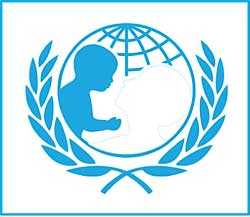Sunday Feb 15, 2026
Sunday Feb 15, 2026
Saturday, 15 June 2019 02:15 - - {{hitsCtrl.values.hits}}
Marking Father’s Day (Sunday, 16 June), the United Nations Children’s Fund (UNICEF) has temporarily removed the image of the parent from its iconic 70-year-old ‘parent and child’ logo, to highlight the need for parents in Sri Lanka to receive increased support through family friendly policies, enabling them to play their full role in the healthy growth and development of their children.
During the first five years, parents are the most important individuals in a child’s life. In this period a child’s brain develops at a never-to-be-repeated speed of more than one million neural connections every second. This period offers a once in a lifetime opportunity to shape a child’s ability to learn, grow and contribute fully to their society. It is during this time that a parent’s role is crucial in ensuring that their child eats nutritious food, is stimulated through play and receives love and protection. Yet many parents have no choice but to work long hours, often away from home, to support their families. Others are required to return to work soon after birth, limiting their ability to breastfeed their children or provide additional care. Women’s careers also suffer. Having a child under age of five also reduces women’s labour force participation in Sri Lanka according to a 2017 World Bank report.
Parents require time to parent their children, and family friendly policies, such as paid parental leave and breastfeeding breaks, enable them to give their children the best start. While Sri Lanka has made strides, the implementation and availability of family friendly policies for parents in the workplace is inconsistent in both the public and private sectors.
With family friendly policies good for families, businesses and economies, UNICEF is globally calling for increased investment in four priority areas;
1. At least six months of paid parental leave that is available for both parents. In Sri Lanka, since 2018 every employed woman has been entitled to 84 paid working days of maternity leave and the government has now provided additional tax benefits to business to support maternity leave. However, there is very limited provisions for fathers to receive paternity leave, with Government employees entitled to just three working days, and private sector paternity leave decided on a company by company basis.
2. Breastfeeding facilities and paid breastfeeding breaks for women returning to work. In Sri Lanka, mother in the public sector are entitled to 60 minutes of breastfeeding breaks for a child’s first six months. Within the private sector female employees are entitled to two 30-60 minute breastfeeding breaks per day for the child’s first year. This is an impressive commitment from the Government. However, there is no obligation for employers in Sri Lanka to provide breastfeeding facilities for parents onsite.
3. Affordable, accessible and quality childcare services. In Sri Lanka the ‘National Guidelines for Child Day Care Centres’ was introduced in 2017, with a ‘National Policy for Child Day Care Centres’ currently under development and designed to increase investment in this area. Further, the 2019 Budget sets out plans for concessionary loans for large business to provide childcare facilities. However, at present most working parents have no or limited access to quality childcare services, limiting their ability to enter or return to the workforce.
 4. Child grants that support all families with children. Globally child grants, including cash transfers, are being implemented to support the most vulnerable and ensure they can access crucial services for children. Evidence shows that cash transfers play an important role in keeping families out of poverty, helping to reduce parental stress and enhance family wellbeing. In Sri Lanka, while most services for children are provided by the state free of charge, child grants should be explored as a way of addressing the economic and social disparities faced by families across the country.
4. Child grants that support all families with children. Globally child grants, including cash transfers, are being implemented to support the most vulnerable and ensure they can access crucial services for children. Evidence shows that cash transfers play an important role in keeping families out of poverty, helping to reduce parental stress and enhance family wellbeing. In Sri Lanka, while most services for children are provided by the state free of charge, child grants should be explored as a way of addressing the economic and social disparities faced by families across the country.
“Parenting is the most important job in the world, but for many their working life is limiting their ability to parent in the way they would really like, impacting the health and education of their children, and their own productivity,” said UNICEF Sri Lanka Representative Tim Sutton. “We have removed the parent from UNICEF’s brand to highlight how critical parents are. We call on everyone – businesses and the public sector – to continue and prioritise family friendly policies in the workplace, so that parents can parent, children can develop fully and Sri Lanka can reap the full rewards in work and productivity.”
In July, the Government of Sri Lanka and UNICEF will co-host the ‘Redesigning the Workplace of the Future: Sharing Responsibility for Family-Friendly Policies’ summit in New York.
Representing the Government will be Minister of Finance Mangala Samaraweera, accompanied by MAS Kreeda CEO/Managing Director Sarinda Unamboowe, with leaders from Government, business, the UN, academia and civil society from around the world also in attendance. The summit will aim to showcase and mobilise support to ensure more parents globally benefit from these policies.
UNICEF is guided by The Convention on the Rights of the Child (UNCRC), which marks its 30 anniversary in 2019. Article 18 of the Convention states that governments have a responsibility to provide support to parents in bringing up their children, especially if both parents work outside the home.